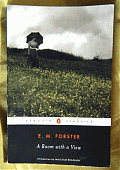
E.M. Forster
A Room with a View
Always on my list of books to read set in Italy, A Room with a View finally surfaced to the top. The thin book is larger than it looks; my edition includes a bulky but fine introduction by Malcolm Bradbury that enticed my appetite, and kept me on the look out for rooms with views and views in general. I didn’t have to read far. E.M. Forster opens his book with a sentence cradling words of the title—a rarity in literature, an equivalent to red alert.
The story concerns Lucy Honeychurch who has come to Italy under the supervision of her cousin, Miss Bartlett. Miss Bartlett is an old-fashioned spinster who uses a front of unselfishness to get her way. The rooms with views in the hotel Bertolini are hers and Lucy’s soon after she complains loudly at dinner. When the rooms are offered to the ladies by old Mr Emerson, she refuses the offer without elaborating her excuse that, “It is quite out of the question.” But eventually Miss Bartlett accepts and she, using the excuse that Lucy shouldn’t take the room of young Mr Emerson, gets the best room.
E.M. Forster works his social satire throughout the book, glowing around Miss Bartlett and Mr Vyse, a high-class, cultured and aimless man who becomes Lucy’s fiance in Part Two. Miss Bartlett and Mr Vyse have solid immutable personalities where Lucy drifts on the elements of whoever is nearest. Though she doesn’t like Miss Bartlett after the “incident” in Florence, she begins to trust her again later in the book. The same oscillation can be seen in the relationship between Lucy and several of the other characters. And even at the end, when the life-change has been worked in her, it’s difficult to tell if it’s really her desires and doing or simply the new influence she has fallen under. Only when she plays the piano is she herself. Like Mr Beebe says:
If Miss Honeychurch ever takes to live as she plays, it will be very exciting—both for us and for her.
But in life away from the piano she finds it difficult, or even unsatisfactory, to make her own choices. This comes after she witnesses a murder in the Piazza Signoria in Florence:
For good or evil, Lucy was left to face her problem alone… This solitude oppressed her; she was accustomed to have her thoughts confirmed by others or, at all events, contradicted; it was too dreadful not to know whether she was thinking right or wrong.
But Lucy’s malleability makes her a perfect central character of this book: a young woman at the turn of the last century, the leaving behind the Victorian and entering the Edwardian (whatever that means!), or better, the shift from stiff society. The Emersons, so named on purpose, engage in conversations about life and being that reminded me, while reading, of E.M. Forster’s contemporary, D.H. Lawrence. And when Lucy falls under the Emerson’s influence, she’s a happier young woman altogether.
I also got great pleasure out of Forster’s observations of the traveler in Italy, much of which is still true today. His subtle wit and elegant prose were a delight to read and though the surface of A Room with a View is light, its human-focused messages dive deep.
· · · · · · · · · · · · · · · · · · · ·